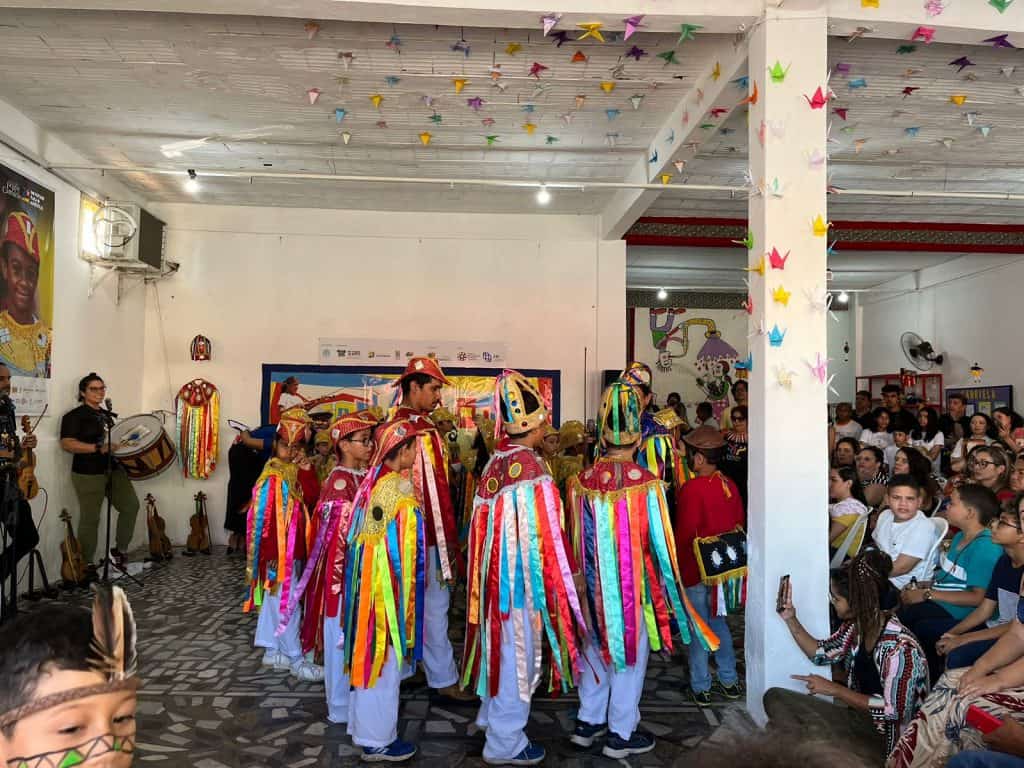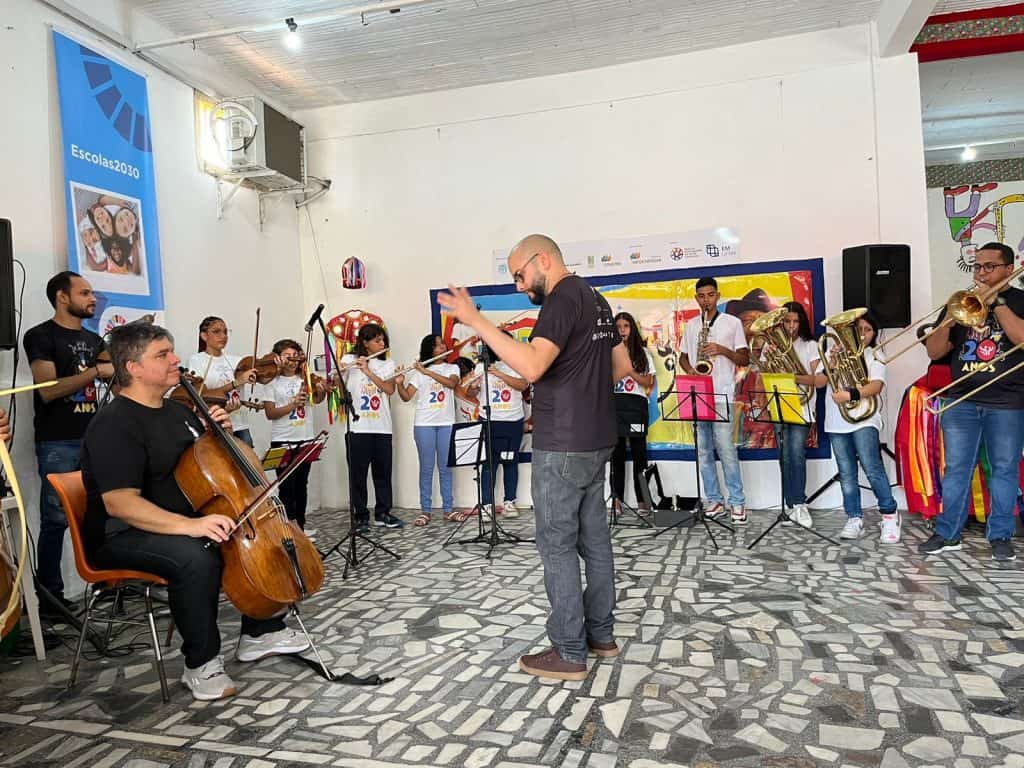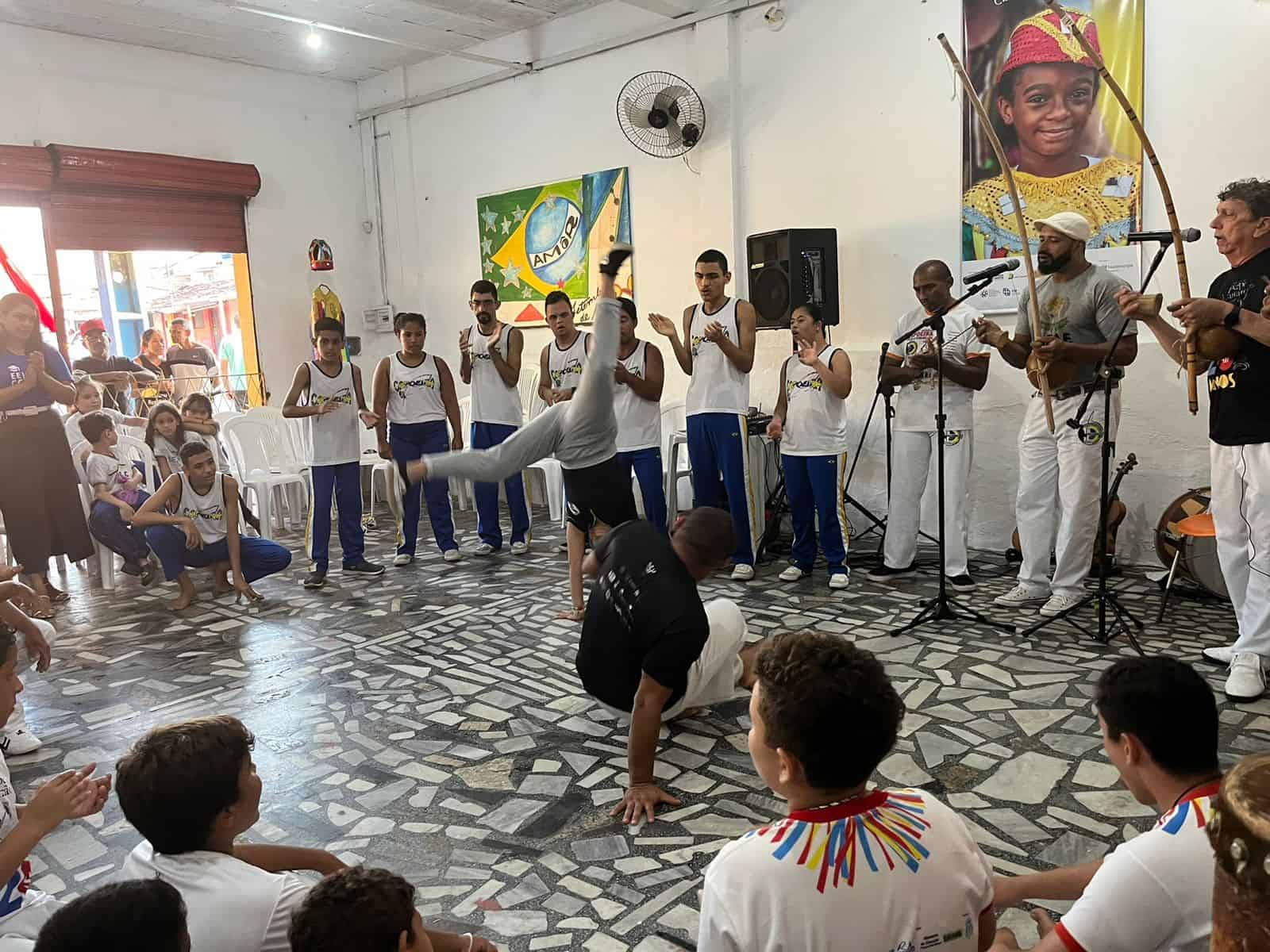In the neighbourhood of Felipe Camarão, in Natal (Rio Grande do Norte), children and young people of different ages, dressed in traditional costumes, swing colourful ribbons and dance alongside their community’s masters of the oral tradition, accompanied by the sound of the fiddle and other musical instruments. The profusion of music, colours and movements attracts the attention of passers-by in the community, who slow down and lean on their open windows or take a seat in the hall to observe the celebration.
The scene illustrates the ambitions of the Conexão Felipe Camarão project: to preserve the cultural heritage of local masters through community action.
Through a dialogue with community elders, the initiative supports increased cohesion between old and young participants through traditional music, Boi de Reis (traditional theatre performances) capoeira (a traditional movement incorporating both dance and martial arts), percussion, mamulengo (a type of traditional puppetry), digital culture and fashion workshops.

It was in this space that Schools2030 Brazil brought together organisations involved in the programme through the Schools2030 Brazil Northeast Regional Forum. Held in September 2023, the
Forum aimed to promote exchanges between these innovative educational organisations and strengthen cooperation between local leaders and actors. The meeting was attended by educators, students and managers from the states of Rio Grande do Norte, Pernambuco and Paraíba.
Representatives of the organisations presented their practices and policies, and reflected on how the support and recognition given by Schools2030 has contributed to transforming education in their communities, as well as explore how they might better operate as a network.
Vera Santana, General Director of Conexão Felipe Camarão, used the event to underscore the importance of culture as an instrument of education and a means of social transformation. “Holistic education also means thinking about the interactive spaces that children have access to, such as theatres, sports grounds and cultural spaces,” she added.
New parameters for quality education
Another topic participants of the Forum sought to address was what is meant by quality education. Helena Singer, General Coordinator of Schools2030 in Brazil (Ashoka), drew attention to the premise of the programme as one that undertakes action research:
“When we say that a school is good, it is generally based on rankings and external exams. We need to reverse this logic, so we support educational organisations to research their own practices over 10 years, with the support of the university [of Sao Paulo], so that they can say what quality education is,” she said.

Douglas Ladislau, Schools2030 Brazil’s Coordinator of Action Research (FESUP), explained a little more of the action research methodology, stating: “In action research, universities carry out research in partnership with schools. Currently, we have a group of organisations that act as reference schools for transformative education in their communities.”
When asked what their hopes are for the future of education, Shaibu and Bakari both insisted that more teachers globally need to be encouraged to share their innovative classroom practices with one another, and they believe Faved is the perfect platform to do this. They look forward to reading about more innovations from around the world, and providing feedback on how they have found trialling them in their own settings.
We also look forward to following Shaibu and Bakari’s work and the ways in which educators globally will incorporate what they learn from Micro Forest into their own classrooms!
These 27 organisations have been researching practices that they determine as innovative. “Each institution reflects on this practice, producing indicators on learning,” he added.
Northeastern educators in connection
Among the organisations present at the Forum was the Pisada do Sertão Cultural Association , represented by Co-Founder and Manager Rafaella Lopes Gonçalves Bandeira. Located in Poço de José de Moura, in the interior of Paraíba, the institution’s work is also aimed at promoting cultural knowledge and practices through popular education.
“By listening to the community, we formulated the axes of our curriculum: learning to be, learning to do and learning to live together” she said. The curriculum integrates cultural activities such as regional dances, music, reading, digital empowerment, games, sport, entrepreneurship and leadership.
We looked for schools that did different things to inspire us. With each experience, we reflected and thought about how we could bring that to our practice and, gradually, we changed.
Leila Coelho, Director of Escola Nossa Senhora do Carmo
Leila Coelho, Director of Escola Nossa Senhora do Carmo (a hub school located in Bananeiras that has been involved with Schools2030 Brazil from the outset) shared her experiences of how the school has reinvented itself as the ‘School of Dreams’, through a process that required active listening to the community and taking inspiration from other transformative schools both in Brazil and internationally.
“We looked for schools that did different things to inspire us. With each experience, we reflected and thought about how we could bring that to our practice and, gradually, we changed” she commented. Today, the institution works with multi-age research projects that explore how children’s curiosities can be leveraged to engage them on their own unique learning path. Ana Lucia de Lima Ferreira, founding partner of the Abdalaziz de Moura Institute, in Gravatá (PE), also spoke at the Forum. Her unique organisation aims to bring together diverse actors from education, agriculture and other fields to develop methodology that guides public policies across different sectors, bound by a focus on sustainability.
Reflecting on the value and purpose of the Schools2030 Forum, Ana Lucia noted: “These experiences make it clear how rich it is to know the specifics of each location, valuing and promoting these actions so that people seek better days. Exchanging knowledge, valuing what communities do and what projects mean in people’s lives is critical. When we combine our actions, we become a movement in transformation.”
This sense of a movement, of creating momentum for transformation, is what Forums like this one are all about for Schools2030, not only in Brazil but globally. Coming together in such spaces – at regional, national and global levels – is vital for exchanging knowledge and strengthening connections that transcend geography. Through the next phase of Schools2030, teams across the world will convene more and more meetings of innovative and like-minded organisations who can share their challenges and successes in their hopes for a better future for learners.
